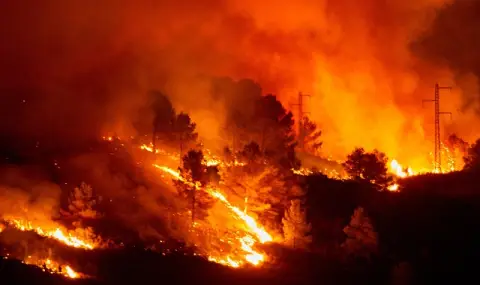Football of devastating fires and floods from Greece has circulated the world in 2023. Things are not looking good this year either. The fires started back in March. What about the climate in Greece? Will this summer get worse?
During the day, the air is colored first yellow, then orange, and at sunset it looks as if the sky is on fire. Thousands of tons of sand from the Sahara, carried to Greece by the southern winds, turned the country into a set for a science fiction film. The people of Athens had never seen anything like it. It looked scary, but charming at the same time. And not entirely harmless: many people had breathing problems and had to seek emergency help in hospitals.
Social networks exploded: apocalyptic footage from Athens went around the world. But this drifting of desert dust into the atmosphere is nothing new. Only the scale and duration of the phenomenon were unusual this time: even a week later, the dust has not completely disappeared. And meteorologists warn that such events may become more frequent in the future.
Christos Zerefos, head of the Academy of Athens and plenipotentiary on climate change, emphasizes that such natural phenomena will not only become more frequent, but will also become more intense. However, he reassures that sand from the Sahara has been reaching Europe for as long as the Mediterranean Sea has existed. Now the phenomenon was due to winds from Libya and Chad that carried desert dust across the sea. In Arabic it is called "hamsin" - the word means "fifty" and describes the number of days such a dry desert wind can blow. Every few years huge clouds of dust are formed, sometimes reaching as far as England.
The Mediterranean is overheated
However, according to meteorologists, the real problem is not the sand from the Sahara, but the overheating of the Mediterranean Sea. In particular, in its eastern part, the temperature of the sea surface is two degrees Celsius higher than that measured in the last hundred years.
The climate crisis is not from yesterday, but the Greek public hardly pays attention to it. People remember it only when fires break out somewhere, as was the case in the summer of 2023, or when extreme rainfall and floods follow.
Many Greeks are pleased that this winter has been warm, allowing them to reduce their heating costs. But this pushed forward the fire season, which this year started much earlier than usual.
Forest fires already in March
The first forest fires of the season broke out at the end of March in Pieria, not far from Mount Olympus in northern Greece. It took more than a week to put them down. But also in general: for the first time so early (in March), a total of twelve large fires were registered in Greece. This usually doesn't happen before the end of May.
At the beginning of April, a large fire broke out near Lasithi on the island of Crete, probably caused by arson. Several thousand hectares of forests and agricultural land burned. Only then were preventive measures taken, including restrictions on Crete and the islands of the South and North Aegean, such as a ban on open fires, especially in rural areas, heavy fines and even arrest for offenders.
But the next big fire was not long in coming: on April 22, a forest caught fire on the island of Paros, and winds of up to 8 on the Beaufort scale made it difficult for firefighters to extinguish the fire. In the Aegean region, the situation remains critical, with strong winds, high temperatures and insufficient rainfall making it difficult to fight the fires.
During his visit to Canada last month, Prime Minister Kyriakos Mitsotakis ordered seven new Canadair DHC-515 firefighting aircraft. But it will be some time before these machines are put into action - first they have to be manufactured, equipped and reach Greece. However, the problem is deeper: it seems that the Greek authorities have not learned much from their own mistakes and failures in the past, because more money continues to be thrown into extinguishing forest fires than into prevention, i.e. preventing them.
The shameful record of 2023
Against the background of high temperatures, poor preparation and weak prevention, there are reasonable fears that this year Greece will surpass the shameful record of last year, when a total of 1,726,260 hectares of forests and fields burned by the end of August - nearly 42% of the total burned area in EU member states during this period. This puts Greece in first place both in Europe and among the 20 Mediterranean countries. And the fire in Evros, which destroyed about 938,000 hectares, is the biggest in Europe since the year 2000.
Extreme weather events are becoming the norm. In 2023, the fires were followed by floods - like those in Thessaly. The scars of extreme flooding in this agricultural region are still visible, with a number of villages still uninhabited and vast areas of agricultural land remaining uncultivable.
Hot, hot and hot again
2023 was the warmest and driest year in Greece since 1991. The temperature of the sea water is among the highest, which is already felt also in otherwise cooler areas such as the island of Lesbos or in the Ionian Sea. In the southeastern part of the Aegean Sea, the temperature of the sea water last summer exceeded 28 degrees.
According to scientists, in July 2023 the inhabitants of Greece experienced the longest heat wave ever recorded: maximum temperatures of over 40 degrees Celsius were measured in more than 150 places in the country. The highest of them reached 46.4 degrees - in Gitio in the Peloponnese.
In general, temperatures in the summer of 2023 were unbearable - especially for people in cities. And this does not bode well for the coming summer. Many Greeks fear that it will be even hotter and drier.
